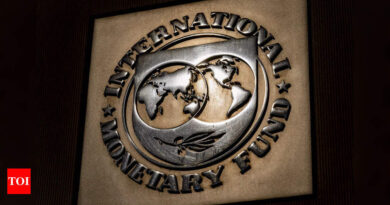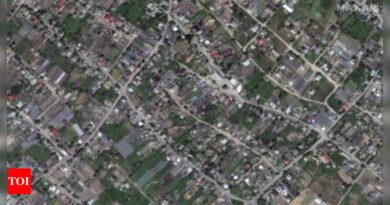Putin seeks to project strong image as military questions linger – Times of India
Putin is due to speak Thursday at a forum titled “Strong Ideas for a New Time” in Moscow, an annual event whose title has taken on unexpected symbolism after the rebellion by Wagner leader Yevgeny Prigozhin’s forces that came within 200 kilometers (124 miles) of the capital.
The president returned to Moscow overnight from southern Russia’s Dagestan republic where he held talks with regional officials on promoting tourism development. Saturday’s mutiny wasn’t mentioned though one official thanked Putin for visiting “at such a difficult time.”Unusually, state television showed Putin mixing with cheering local residents, even kissing a young girl on the head and posing for a selfie with her. That contrasted sharply with a strict Covid-19 quarantine regime the Kremlin has long maintained for anyone due to meet Putin to avoid possible infection of the 70-year-old leader.
Despite the effort to portray the crisis as at an end, questions continued to hang over the extent to which elements within the military and the security services were aware of Prigozhin’s plan to march on Moscow to oust top Defense Ministry officials.
Sergei Surovikin, a top general repeatedly praised by Prigozhin for his leadership in the war, hasn’t been seen since the mutiny ended. Putin put Surovikin in charge of Russia’s army in Ukraine in October.
The general was replaced as overall commander in January by army Chief of the General Staff Valery Gerasimov, one of two men along with Defense Minister Sergei Shoigu that Prigozhin had vowed to oust.
Surovikin was last seen in a video posted on the Defense Ministry’s Telegram channel on Saturday urging Prigozhin and his forces to stop their uprising and to “obey the will and order” of the president.
The New York Times reported that Surovikin knew something of Prigozhin’s plans to rebel, citing unidentified US officials who said other Russian generals may also have supported the Wagner leader’s attempt to overthrow the Defense Ministry’s leadership.
Wagner’s heavily armed troops first took control of Russia’s southern city of Rostov-on-Don, and then moved rapidly toward Moscow across 780 km of territory, blockading army units along the way without significant resistance.
Prigozhin only called a halt to the advance after accepting a deal brokered by Belarusian President Alexander Lukashenko that allowed him to go to the neighboring country after criminal charges were dropped against the Wagner founder or his fighters.
The dizzying chain of events has left the US, Europe and China puzzling over the political fallout from a rebellion that shattered Putin’s invincible image as Russia’s leader. The crisis highlighted bitter divisions within Russia over the faltering war in Ukraine that’s the biggest conflict in Europe since World War II, as a Ukrainian counteroffensive continues to try to push Putin’s forces out of occupied territories.




